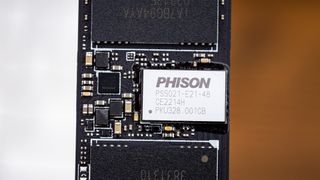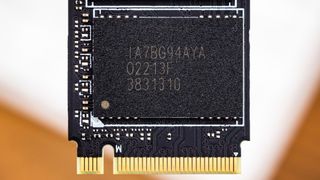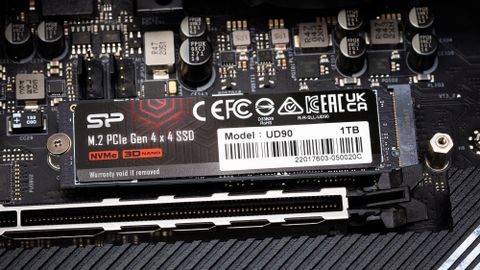Tom's Hardware Verdict
The Silicon Power UD90 is an excellent budget PCIe 4.0 SSD. Performance is competitive with similar drives and is more than enough for the average user. Basic software support and a good warranty are coupled with reasonable pricing, making it a good choice for builds that don’t need a lot of capacity.
Pros
- +
Good all-around performance
- +
Power efficient
- +
Affordable
- +
Good warranty
Cons
- -
May only be available at 1TB in some regions
- -
Runs a little hot
Why you can trust Tom's Hardware
The Silicon Power UD90 is the first drive we’ve had on our testbed with Phison’s new E21T SSD controller. If you only need 1TB of capacity, this is a relatively inexpensive PCIe 4.0 drive that would work great in a Playstation 5 or desktop PC. Thanks to the DRAM-less controller and 176-layer TLC flash, it’s also power efficient enough to work great with laptops. It comes with a fairly decent warranty and some software support, too, earning a spot on our list of Best SSDs. However, we do recommend additional cooling, if possible.
The UD90 finds itself up against tough competition from drives we’ve recently reviewed, including the HP FX900 and Patriot P400. If you’re looking for a high-end PCIe 4.0 drive, there are better options, but this segment is the better value for your dollar. Many top-tier PCIe 3.0 drives with DRAM have come down significantly in price, so the real question is if it’s worth compromising with a drive like the UD90. For the PS5, absolutely; for PCs, it depends. These newer drives can be very efficient for laptops and make good primary or secondary drives for desktops, assuming you don’t need more than about 1TB of space.
The UD90 uses the same flash as many other great drives we’ve reviewed, but it has a new controller. We’re seeing more competition in this space as Silicon Motion has its SM2269XT controller on the way, too. This is a good thing as you have more choices, but it can make it challenging to pick the perfect drive. Perhaps the most significant factor here is cost, and the UD90 should launch at a very attractive price point on Amazon. Let’s see how it measures up to the excellent but more expensive FX900.
Specifications
| Product | 250GB | 500GB | 1TB |
|---|---|---|---|
| Pricing | N/A | N/A | $94.99 |
| Capacity (User / Raw) | 250GB / 256GB | 500GB / 512GB | 1024GB / 1024GB |
| Form Factor | M.2 2280 | M.2 2280 | M.2 2280 |
| Interface / Protocol | PCIe 4.0 x4 | PCIe 4.0 x4 | PCIe 4.0 x4 |
| Controller | Phison E21T | Phison E21T | Phison E21T |
| DRAM | No (HMB) | No (HMB) | No (HMB) |
| Flash Memory | 176-Layer Micron TLC (B47R) | 176-Layer Micron TLC (B47R) | 176-Layer Micron TLC (B47R) |
| Sequential Read | 3,900 MBps | 4,800 MBps | 4,800 MBps |
| Sequential Write | 1,800 MBps | 3,500 MBps | 4,200 MBps |
| Random Read | 200K | 450K | 570K |
| Random Write | 400K | 550K | 600K |
| Security | N/A | N/A | N/A |
| Endurance (TBW) | 200 TB | 300 TB | 600 TB |
| Part Number | SP250GBP44UD9005 | SP500GBP44UD9005 | SP01KGBP44UD9005 |
| Warranty | 5-year | 5-year | 5-year |
The UD90 comes in three capacities of 250GB, 500GB, and 1TB. Silicon Power has informed us that it intends to launch with just the 1TB SKU in the U.S. The smaller SKUs are for other regions and markets for now. This drive reaches peak performance at 1TB, and that capacity tends to be the “sweet spot” for mid-range drives like this, so this is not too terrible. Some users prefer smaller drives for the OS in multi-drive builds, but it’s hard to get the most out of a fast PCIe 4.0 drive without a higher capacity for more flash and interleaving.
The 1TB drive reaches 4.8/4.2 GBps for sequential read and write and 570K/600K IOPS for random read and write, both respectively. These numbers are firmly in the mid-range against drives like the FX900 and P400, which use a different controller but the same flash. It’s faster than entry-level PCIe 4.0 drives like the S50 Lite and SN750 SE. The UD90 is warrantied for five years and 600 TB of data writes (TBW) at 1TB, which is pretty solid.
Silicon Power says this will arrive at $94.99, making it very competitive in its intended market segment. This is a bit cheaper than the HP FX900 and the Patriot P400, making it a good budget choice or alternative for the Playstation 5 as well as for cheaper PCIe 4.0 builds.
Software and Accessories
Silicon Power has a download of its “SP ToolBox” available on its site. This piece of software offers information about the drive, including SMART and other diagnostics. It’s basic but better than nothing. You can clone and image the drive with free software options.
A Closer Look



The UD90 has a label on top showing basic information about the drive, such as the capacity and serial number. Under the label, we see the controller in the middle along with a PMIC, flanked by two NAND packages to either side. There is no DRAM. This type of layout can have some advantages, for example as WD touted with its WD Black and SN750, but the average user can just look at it and imagine a balancing of heat dissipation.

The Phison E21T is Phison’s new PCIe 4.0 DRAM-less controller, positioned to compete with InnoGrit’s IG5220 and SMI’s SM2269XT. It also competes with WD’s proprietary controller used on the SN770. This controller has four channels with a bus speed of 1600 MT/s, capable of using current and upcoming TLC and QLC flash. It has Phison’s 4th-Gen LDPC error correction, end-to-end data path protection, and RAID error correction through Smart ECC 2.0. Encryption support for TCG OPAL 2.0 and Pyrite is optionally available but not activated on this drive.
Performance-wise, this controller can hit up to 5/4.5 GBps for sequential read and write, respectively, and up to 780K/800K random read and write IOPS, also respectively. This matches up nicely with the IG5220, which we’ve seen in past reviews of drives like the HP FX900 and Patriot P400. This is our first review of a drive using the E21T, but we expect to see more drives using this controller. We also expect it to be competitive.

The flash packages are labeled IA7BG94AYA which means they contain dies of Micron’s 176-layer TLC. Each package should host four dies, that is 4DP or QDP, at 64GB per die. The total of sixteen dies is ideal for this four-channel controller, allowing peak interleaving at 1TB.
MORE: Best SSDs
MORE: How We Test HDDs And SSDs
MORE: All SSD Content

Shane Downing is a Freelance Reviewer for Tom’s Hardware US, covering consumer storage hardware.
-
2Be_or_Not2Be I think this SSD is better recommended as a value-choice for drives on PCs/laptops, perhaps leaning towards a power-efficiency slant. For any new system that supports PCIe 4.0, especially with a new build, I can't imagine why you wouldn't go with the better SSDs (980 Pro, SN850, etc.) on sale pricing.Reply -
PEnns Why is $94 for 1 TB considered a "New Value Champion", while almost every other company's 1 TB is about the same price??Reply
Are they all value champs now as well? Samsung's 970 and 980 are also about the same price!! -
nitrium Reply
Most I/O happens at QD1 on Windows, and this drive is faster than most of the competiton. I dare say this drive will feel snappier in real world use than a 980 Pro.2Be_or_Not2Be said:I think this SSD is better recommended as a value-choice for drives on PCs/laptops, perhaps leaning towards a power-efficiency slant. For any new system that supports PCIe 4.0, especially with a new build, I can't imagine why you wouldn't go with the better SSDs (980 Pro, SN850, etc.) on sale pricing. -
Rdslw Reply
Obviously, if you find 980 pro at the same price, then there is no reason not to. I am happy that fast drives are getting cheaper, and more popular, that's all. Ud90 seems decent as well, it Survives 600GB at 2GB/s mark, and like 90GB at full speed and that seems enough for me. Definitely gets DECENT drive stamp.2Be_or_Not2Be said:I think this SSD is better recommended as a value-choice for drives on PCs/laptops, perhaps leaning towards a power-efficiency slant. For any new system that supports PCIe 4.0, especially with a new build, I can't imagine why you wouldn't go with the better SSDs (980 Pro, SN850, etc.) on sale pricing.
I would pick one that make the least heat, as I learned hard way, the second m2 on my laptop is right where I keep my palm, and WD black I picked is just so unpleasant I really consider replacing it just because it makes my pams sweaty for no reason.
